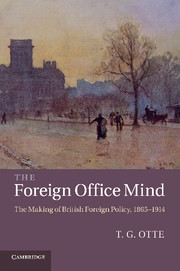Book contents
- Frontmatter
- Contents
- Illustrations (to be found between pages 146 and 147)
- Preface and acknowledgements
- List of abbreviations
- Introduction
- 1 Illusions of supremacy
- 2 The problems of isolation
- 3 Problems of consolidation
- 4 Two Eastern Questions
- 5 The transformation of Great Power politics
- 6 The end of an era
- Conclusion
- Select bibliography
- Index
- Plate section
- References
1 - Illusions of supremacy
the ‘Foreign Office mind’, 1865–1874
Published online by Cambridge University Press: 07 October 2011
- Frontmatter
- Contents
- Illustrations (to be found between pages 146 and 147)
- Preface and acknowledgements
- List of abbreviations
- Introduction
- 1 Illusions of supremacy
- 2 The problems of isolation
- 3 Problems of consolidation
- 4 Two Eastern Questions
- 5 The transformation of Great Power politics
- 6 The end of an era
- Conclusion
- Select bibliography
- Index
- Plate section
- References
Summary
British foreign policy during the Schleswig-Holstein crisis of 1863–4 was hardly deserving of that name. It was a curious and incoherent amalgam of Palmerstonian blustering and anti-Palmerstonian pressures emanating from Windsor and amplified within the Cabinet, presided over by Lord John Russell, who had somehow forgotten that it was all a bluff. Britain’s failure to assert her influence in settling the future of the Elbe duchies has been accorded the place of a landmark in the history of nineteenth-century Great Power politics. After 1864, it is asserted, Britain drifted into a decade-long period of isolation, aggravated further by the failure of the foreign policy-making élite to appreciate the significance of the rise of Prussia and the dangers this would pose to European stability.
Such assessments are informed, inevitably, by a degree of hindsight, but they also bear the deep imprint left by the Great War on the collective mindset of the later twentieth century. For British diplomats, the evolving situation was more complex than later diplomatic historians have allowed for. At the time of Palmerston’s death, in October 1865, the pieces of the international kaleidoscope had not yet fallen into place. A series of unresolved problems complicated international politics, and these were by no means all centred on Germany. The events in Central Europe in the second half of the 1860s affected Britain in different ways. They called into question the often fraught relations with France; and they allowed the Eastern Question, until then largely dormant, to awaken. In the Western hemisphere, relations with the post-bellum United States of America remained strained, while in Central Asia Russia’s renewed expansionist drive posed a formidable challenge to Britain’s strategic interests in the region. These wider changes in the international landscape gave an important impulse to the generational shift in the diplomatic service as the Palmerstonian generation made way for the high-Victorians, and as widely held assumptions of British supremacy began to crumble.
- Type
- Chapter
- Information
- The Foreign Office MindThe Making of British Foreign Policy, 1865–1914, pp. 23 - 79Publisher: Cambridge University PressPrint publication year: 2011



